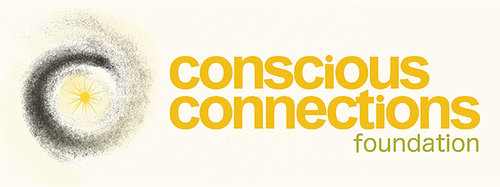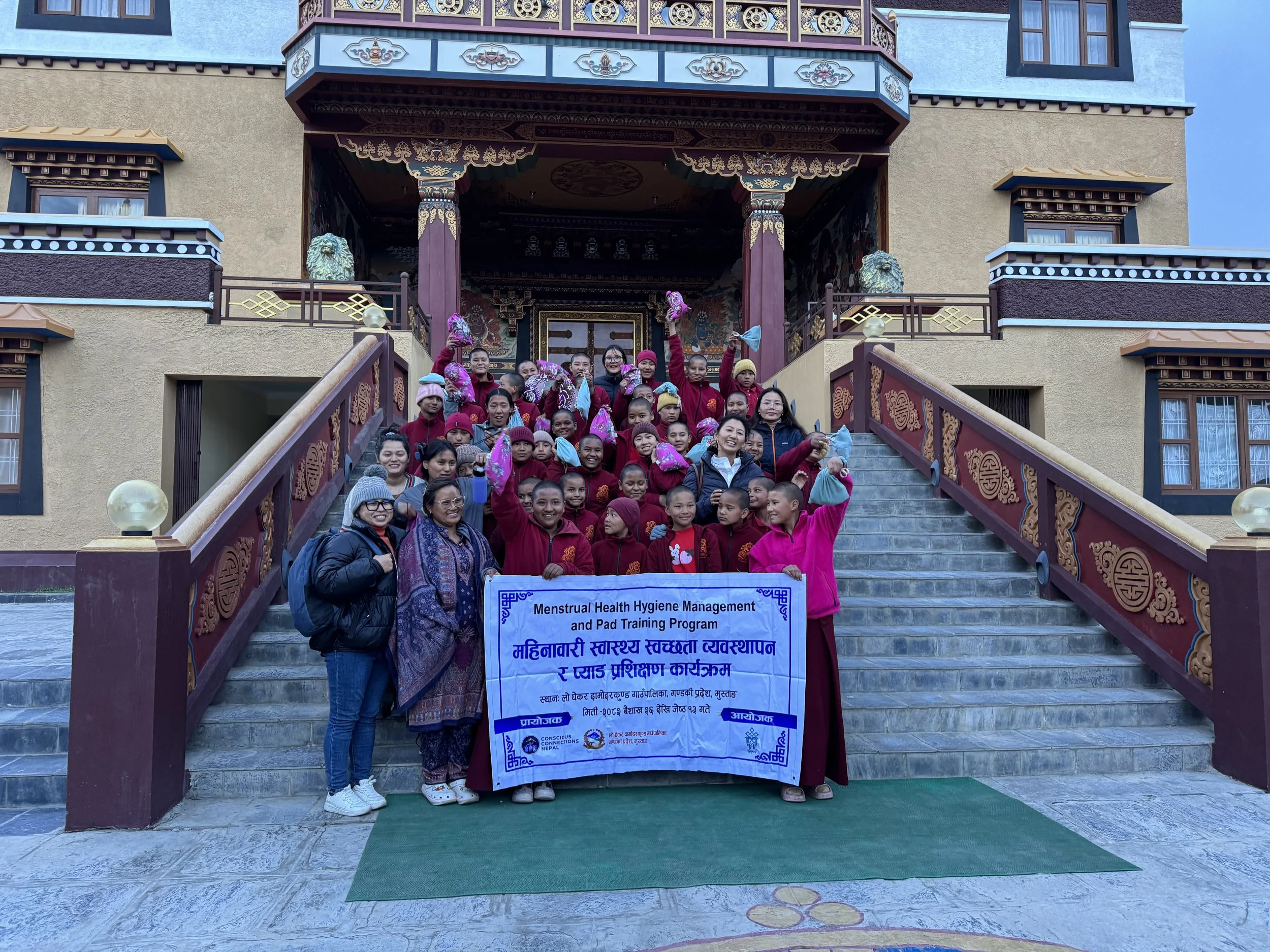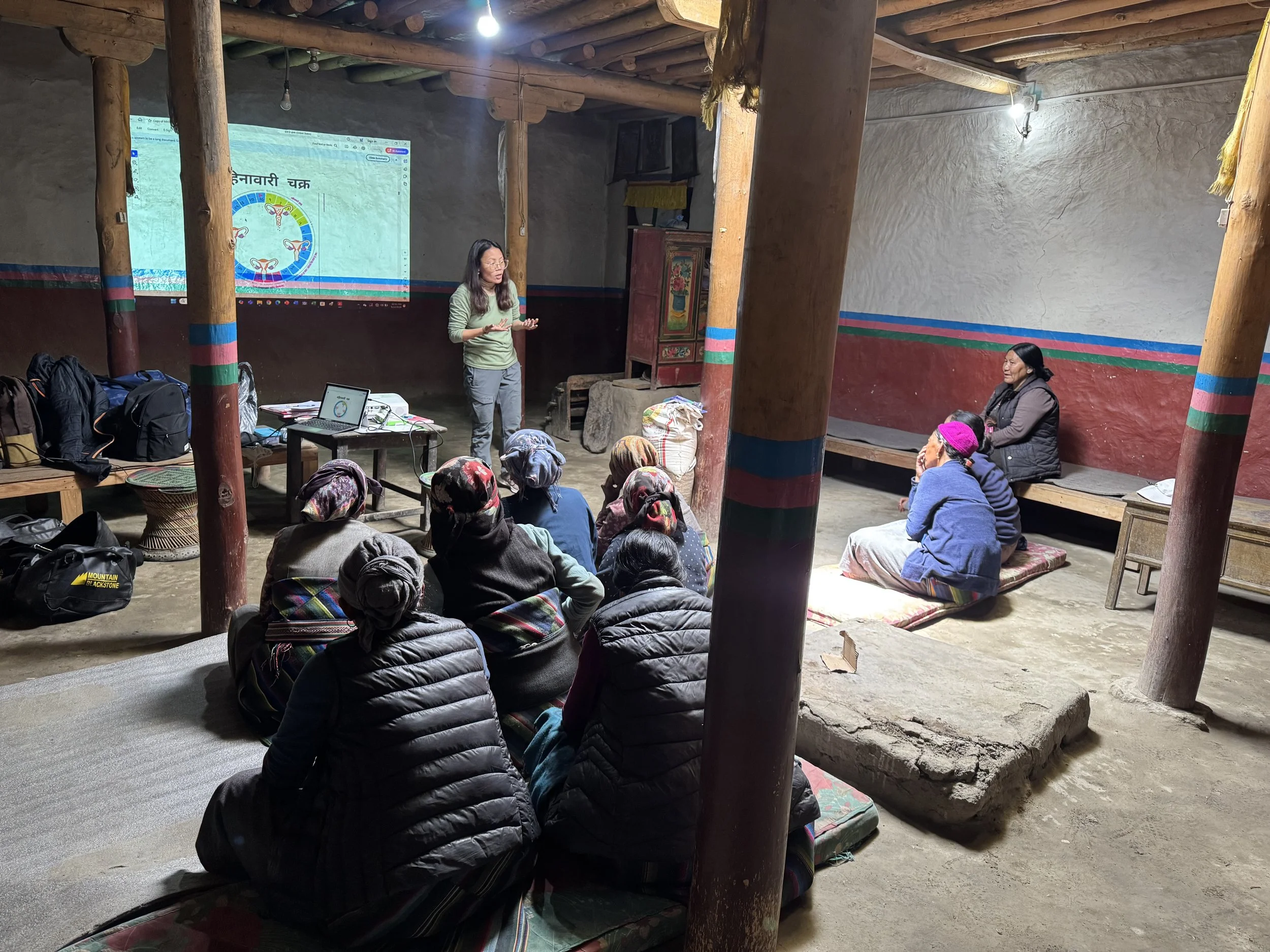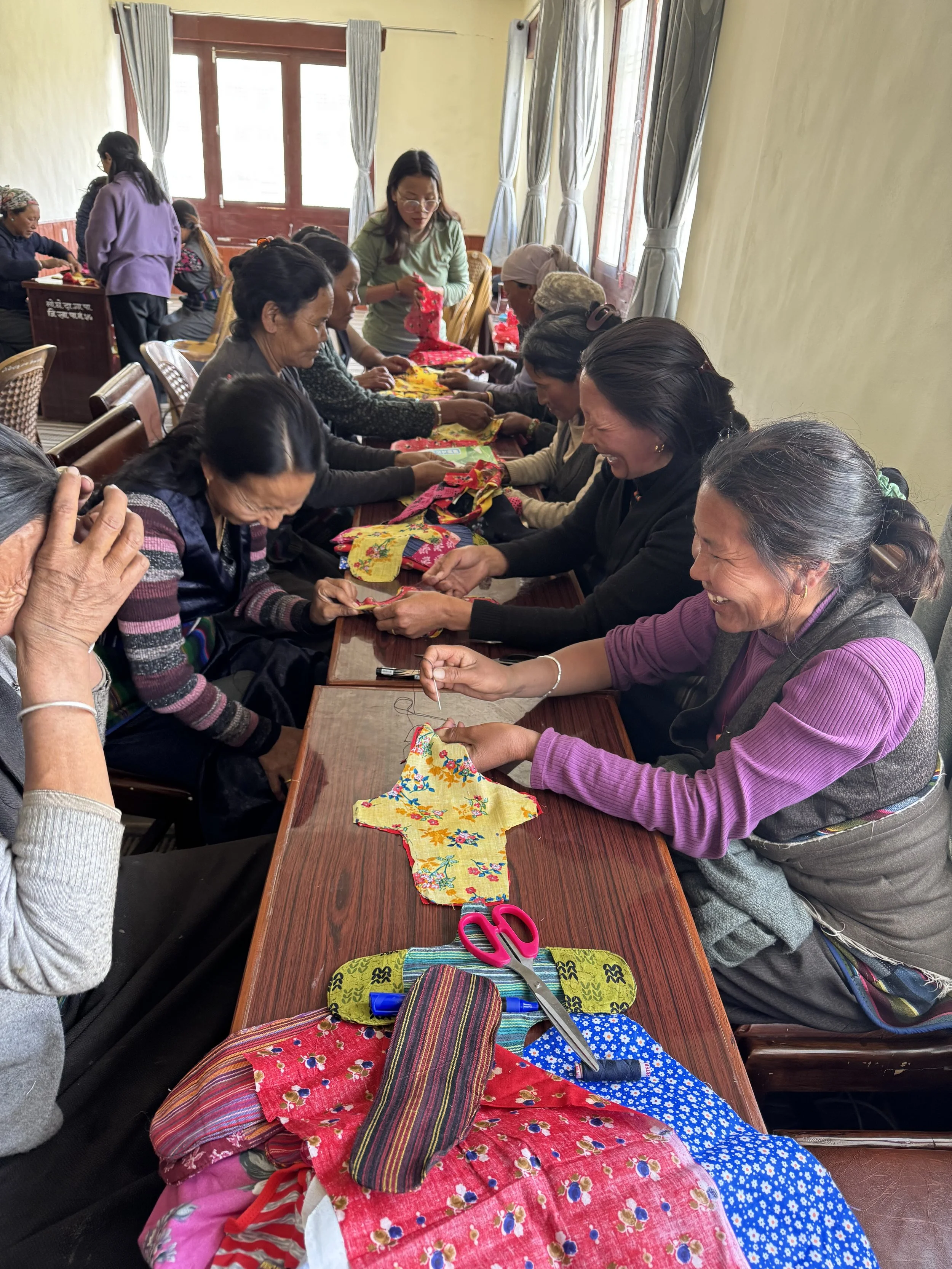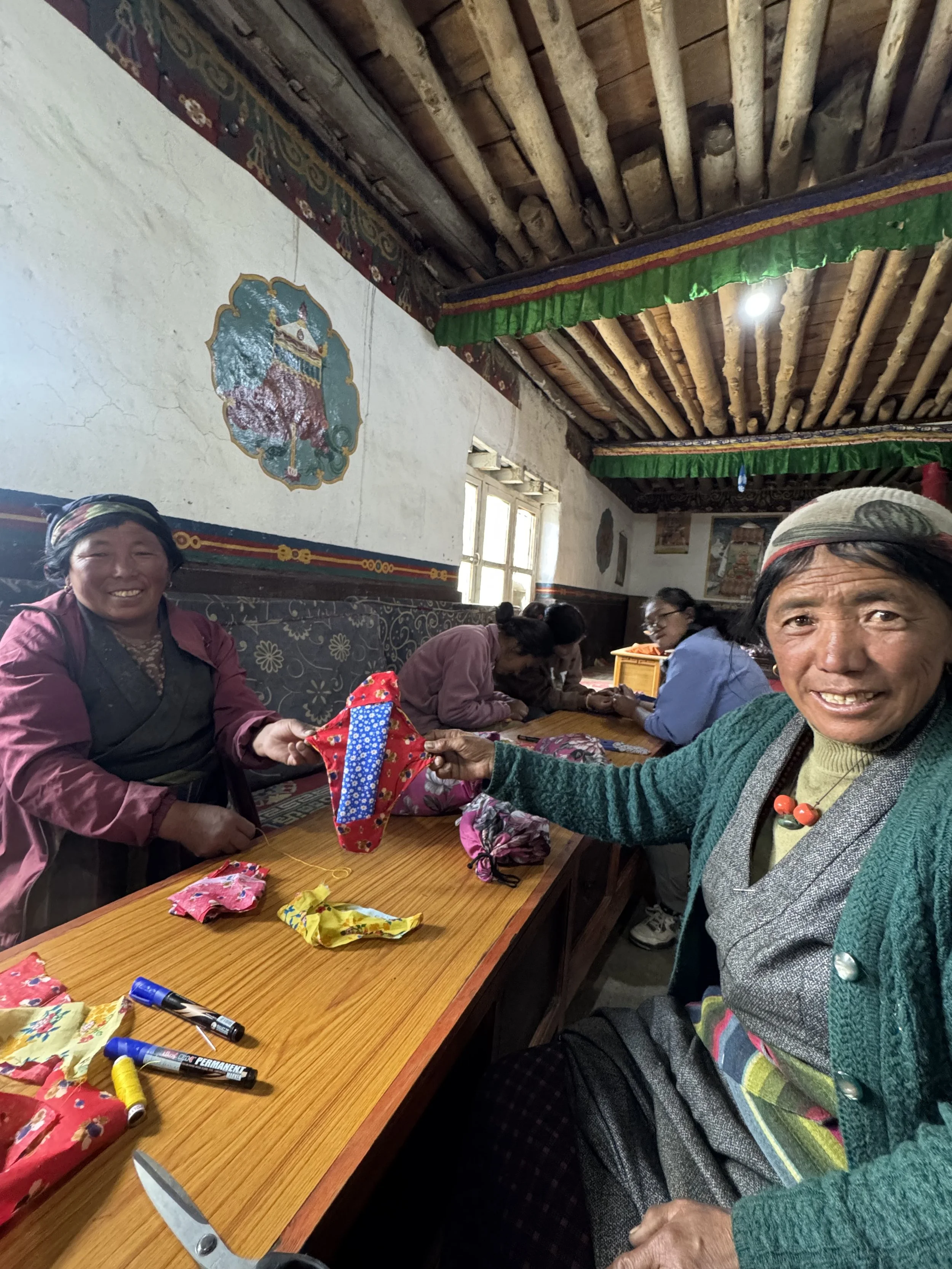CCF teams up with Drokpo Nepal to empower women in Mustang through menstrual hygiene management and pad-making training
Written by Pema Yangkyi Gurung, Finance & Program Officer of Drokpo Nepal
Mustang, often called the “Forbidden Kingdom,” is a remote Himalayan district in the rain shadow of the mountains, with elevations between 2,800 and 4,000 meters (9,186 and 13,123 feet). Its rugged terrain, deep gorges, and high-altitude deserts leave many villages isolated, where health education is scarce and cultural taboos silence conversations about menstruation. Here, many women and nuns still lack the knowledge and resources to manage their periods safely and confidently.
Mustang outlined in red. Source: Google Maps
Chhiring Lhamo Gurung, Vice-Chairman of Lo-Ghekar Damodarkunda Rural Municipality, shared that while the local health post organizes menstrual awareness programs, language barriers often limit their impact. When they learned that Drokpo Nepal could conduct sessions in Tibetan and Mustang languages, they reached out to us. Responding to this need, Drokpo with the CCN team and financial support from CCF, held four Menstrual Hygiene and Pad-making workshops—one in a nunnery and three in different villages. The workshops were designed not only to provide practical knowledge but also to create a safe and inclusive space where women and girls could openly discuss menstruation without shame.
Students from Charang Nunnery with Drokpo Nepal and CCN staff. Photo credit: Drokpo Nepal
The journey to Upper Mustang from Kathmandu was long and challenging for the whole team. After a flight from Kathmandu on May 7, 2025, we traveled nine hours by jeep from Pokhara to Marpha, and then another six hours through rugged terrain and deep gorges to reach Charang at 3,750 meters. The high-altitude desert spread endlessly around us, and the fierce winds of Tsarang village greeted our team at 3:00 PM on May 8, 2025, marking the beginning of our mission.
The following day began with a meeting with local stakeholders, including the Chairperson and Vice-Chairperson of Lo-Ghekar Damodarkunda Rural Municipality, who informed the villages about the menstrual hygiene awareness programs and encouraged participation. Organizing the sessions came with challenges, as villages like Marang lacked proper halls. Additionally, one session overlapped with Buddha Jayanti, and since many women and girls were away on pilgrimages that day, we had to postpone it by one day. With the guidance of Chhiring Lhamo Gurung, however, the Drokpo team was able to overcome these challenges.
Training in Marang. Photo credit: Drokpo Nepal
The session began in Lokhé (Mustangi language) with a warm and welcoming atmosphere, with the aim to make participants feel comfortable. From May 9 to 13, 2025, our MHM program reached three villages and one nunnery in Mustang—Charang (39), Marang (28), Dakmar (45), and Charang Nunnery (36). On May 12, we had to pause the session because of Buddha Jayanti, but every village still received a full day of menstrual hygiene sessions and reusable pad-making training. We began the session with a few open-ended questions about what menstruation meant to them and the words or code words they used for periods. At first, the women were shy, covering their faces with scarves or hands and giggling at questions about menstruation. Many had never openly discussed these topics before, so even simple questions caused laughter and embarrassment. As the session progressed, the initial shyness gradually gave way to curiosity, and the participants began engaging more openly, asking questions and sharing their thoughts and personal experiences.
At the beginning, many participants viewed menstruation as impure. Some referred to it as ལུས་ཀྱི་ནད་ (“Lu Kyi Neh”), translated as “a disease of the body.” Most women believed that periods began from the hips, as they had always heard it described with the word “kepa” from their mother and sister, which means “hips” in the Mustang language. During the sessions, these misconceptions were gently addressed, opening space for dialogue and better understanding. By the end, participants felt more comfortable and began asking questions about family planning, white discharge, and the health of the uterus and breasts.
Marang village participants with pad-making materials. Photo credit: Drokpo Nepal
During the session, one woman in her late fifties described, “Whenever there is dryness around the vagina, I just apply Vaseline. I got relief for some time, but the dryness, discharge, and itching are not going.” The team advised against using Vaseline, explaining that it can trap bacteria and worsen infections. Participants were guided to maintain hygiene, change undergarments regularly, use cotton clothing, clean the vulva with warm water without soap, and stay hydrated.
One woman shared her experience as the session on family planning continued. “Young girls today are lucky to have this information and these options. Back in our day, there were not even small health posts in Mustang. We had to walk miles to Jomsom for family planning services,” reflected one participant. Another woman spoke about her experience with the Copper T contraceptive, saying, “They told us it would last twelve years, but mine came out after just two years. I had to have it removed because of the excruciating pain.” The team explained that procedures like Copper T and tubectomy should always be carried out by experienced doctors to ensure safety and effectiveness.
Charang village participants learn to make pads. Photo credit: Drokpo Nepal
An older woman who is in her late 50s shared how menstrual hygiene was managed in the past. “My friend and I, in our age group, had never seen such period products and never used anything like that when we were young. We just changed the trousers after a few days,” another added. “Now the younger generation has a lot of options, earlier some of us used our headscarf and any piece of clothes available during the period. Back in the day some did not use any of it.”
Participants were taught proper hygiene, safe pad use, washing and drying cloth pads, and avoiding old or dirty clothing to prevent infection. Many were curious about tampons and menstrual cups, asking questions about how to use them. Seeing these products for the first time sparked curiosity, and some participants even wondered and asked, “If we insert the tampon or cup into the hole, then where can we urinate from?” The team explained patiently, helping them understand the separate functions of the menstrual and urinary passages by introducing basic reproductive anatomy.
Women in the Dakmar training display handmade pads. Photo credit: Drokpo Nepal
Meals were provided during the sessions, making the atmosphere warm. Over shared meals, women felt comfortable opening up, exchanging experiences, and learning together. Beyond raising awareness, the workshops emphasized practical training in reusable pad-making. Each session lasted a full day, starting with engaging discussion before meals and followed by a hands-on workshop, where participants learned to make their own reusable pads. This empowered women to produce their own pads independently and manage their menstrual health with dignity. Over the course of the program, 170 menstrual health kits were distributed among 148 women, nuns and girls in Charang village (39), Marang Village (28), Dakmar Village (45), and Charang Nunnery (36). Each contains reusable cloth pads, underwear and soap with the aim of supporting the dignity and daily well-being of women, girls, and nuns.
With financial support from CCF, Drokpo Nepal along with CCN was able to make a meaningful impact in Mustang by breaking menstrual taboos, raising awareness, and providing practical skills and resources. The workshops not only offered education on menstrual health, family planning, menopause, and reproductive cancers but also created safe spaces for open dialogue. By teaching reusable pad-making, distributing hygiene kits, and addressing the needs of diverse groups, including LGBTQ+ individuals and those with disabilities. The sessions empowered women, girls, and nuns to manage their health with confidence and challenge harmful social norms.
Students from Charang Nunnery learn to make pads. Video credit: Drokpo Nepal
Thank you for your ongoing support! Help us continue to support critical healthcare needs in Nepal.
